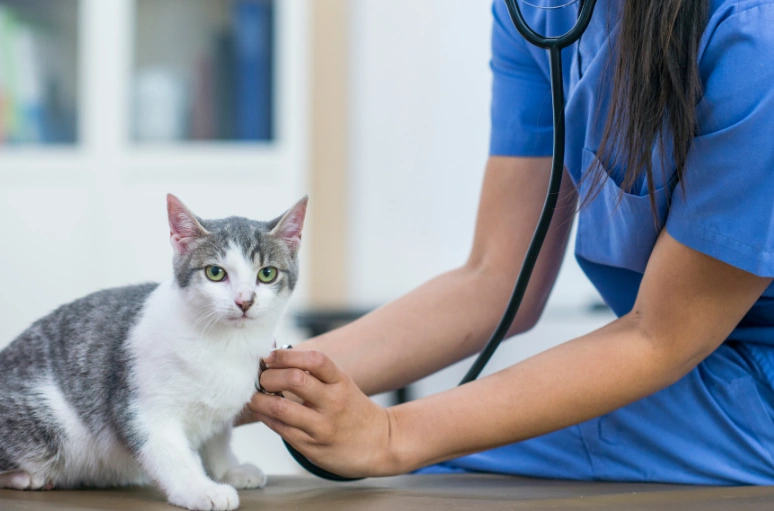As a responsible cat owner, knowing when your feline companion requires a cat emergency vet is crucial. While routine visits to the vet are essential for maintaining your cat’s health, certain situations warrant a trip to the emergency vet. Recognizing these signs and acting promptly can significantly affect your cat’s well-being. This article will explore the key indicators indicating it’s time to take your cat to the emergency vet.
Difficulty Breathing
It may indicate a respiratory emergency if you notice your cat struggling to breathe, gasping for air, or displaying rapid, shallow breaths. This could be due to an obstruction, asthma, heart failure, or other critical conditions. A visit to the cat emergency vet is essential to diagnose and address the underlying cause.
Severe Injury or Trauma
In cases of severe injury or trauma, it is crucial to seek a cat emergency vet. This includes accidents, falls from a significant height, being hit by a vehicle, or any other incident that may result in broken bones, lacerations, or internal injuries. Even if your cat appears stable, internal injuries can be life-threatening and require immediate medical intervention.
Uncontrollable Bleeding
If your cat is experiencing uncontrolled bleeding, whether from an injury or a sudden onset, it is considered an emergency. Apply pressure to the affected area with a clean cloth or gauze and immediately transport your pet to the cat emergency vet. Excessive bleeding can lead to severe blood loss and shock if left untreated.
Ingestion of Toxic Substances
Cats are curious, and their exploratory nature can sometimes lead them to ingest toxic substances. If you suspect your cat has ingested something poisonous, such as certain plants, human medications, household chemicals, or toxic foods, it is crucial to seek immediate veterinary assistance. Time is of the essence when it comes to poisoning cases, and early intervention can save your cat’s life.
Seizures
Various factors, including epilepsy, toxins, brain disorders, or underlying health conditions, can cause cat seizures. If your cat experiences a seizure that lasts longer than a few minutes or multiple seizures within a short period, it is an emergency. Contact your cat emergency vet to ensure your cat receives the necessary evaluation and treatment.
Sudden Paralysis or Inability to Move
If your cat suddenly becomes paralyzed or experiences an inability to move their limbs, it could indicate a spinal injury, nerve damage, or other severe medical conditions. Immediate veterinary attention is crucial to determine the cause and provide appropriate treatment options.
Unconsciousness or Collapse
If your cat loses consciousness or collapses, it is a clear sign of a medical emergency. It could be due to a heart condition, severe illness, trauma, or other critical factors. Time is of the essence in such situations, and you should rush your cat to the emergency vet without delay.
Difficulty Urinating
If your cat is straining to urinate or cannot, it could be a sign of a urinary obstruction, a life-threatening condition, especially in male cats. This condition requires immediate veterinary attention to relieve the blockage and prevent further complications.
Persistent Vomiting or Diarrhea
Occasional vomiting or diarrhea may not always be an emergency. Still, suppose it persists for an extended period or is accompanied by other concerning symptoms like lethargy, dehydration, or blood in the vomit or stool. In that case, it’s crucial to seek veterinary care. These symptoms can be indications of serious underlying issues that require immediate attention.
Allergic Reactions
If your cat displays signs of an allergic reaction, such as facial swelling, difficulty breathing, hives, or severe itching, it is essential to act promptly. Allergic reactions can escalate quickly, leading to anaphylaxis, a potentially life-threatening condition. Seek your cat emergency vet to stabilize your cat and administer appropriate treatment.
Eye Injuries or Abnormalities
Significant eye injuries, sudden vision loss, or abnormalities like redness, discharge, cloudiness, or eye protrusion should be treated as emergencies. Eye conditions can worsen rapidly and potentially result in permanent damage if not addressed promptly by a cat emergency vet.
Heatstroke
Cats are susceptible to heatstroke, especially in hot and humid climates. Suppose your cat shows excessive panting, drooling, weakness, vomiting, or collapse due to heat exposure. In that case, it is crucial to cool them down immediately using cool (not cold) water and seek veterinary care as soon as possible.
Persistent Pain or Distress
Suppose your cat displays severe and persistent pain, distress, or discomfort, such as vocalizing, restlessness, inability to lie down, or a hunched posture. In that case, it may be indicative of a severe underlying condition. Prompt veterinary attention is necessary to diagnose and alleviate your cat’s pain.
Severe Pain or Injury
If your cat is experiencing severe pain due to an injury, such as a fractured bone, deep laceration, or significant trauma, it is essential to seek immediate veterinary care. Cats are skilled at masking pain, so if you notice signs of distress, vocalization, or reluctance to move, it could indicate a severe problem that requires urgent attention.
Difficulty Giving Birth
Suppose your pregnant cat is experiencing prolonged and unproductive labor or has been in active labor for more than two hours without producing a kitten. In that case, it is crucial to contact an emergency vet. Complications during delivery can jeopardize the mother’s and the kittens’ health and may require veterinary intervention.
Suspected Ingestion of Foreign Objects
Cats are notorious for ingesting things they shouldn’t, such as small toys, string, or other foreign objects. If you suspect your cat has swallowed something potentially harmful or is experiencing symptoms like vomiting, gagging, or abdominal pain, it is crucial to seek immediate veterinary care. An obstruction in the digestive system can lead to severe complications if left untreated.
Sudden Loss of Balance or Coordination
If your cat suddenly develops a lack of balance, stumbling, falling, or displaying an inability to coordinate movements, it could be a sign of a neurological issue or an underlying illness. These symptoms require immediate veterinary attention to determine the cause and initiate appropriate treatment.
Unresponsiveness or Lethargy
If your cat appears unusually passive, weak, or unresponsive and fails to react to stimuli, it may indicate a severe condition or a medical emergency. Cats are typically alert and responsive, so any sudden behavior change should be taken seriously and evaluated by a veterinarian promptly.
Suspected Exposure to Toxins
If you suspect your cat has been exposed to a toxic substance, such as antifreeze, pesticides, or household chemicals, it is essential to seek immediate veterinary assistance. Many toxins can cause severe symptoms and organ damage, and immediate treatment is crucial to minimize the potential harm.
Swollen Abdomen
A swollen or distended abdomen in cats can indicate various severe conditions, including fluid accumulation, tumors, or internal organ enlargement. If you notice a sudden or significant increase in the size of your cat’s abdomen, it is vital to have it evaluated by a veterinarian as soon as possible.
In case of a pet emergency in Aurora, IL, don’t hesitate to contact Sunshine Pet Hospital immediately. Our experienced team is here to provide urgent veterinary care for your beloved pets. Call us to receive prompt assistance and guidance during critical situations. Your pet’s health and well-being are our top priorities.


